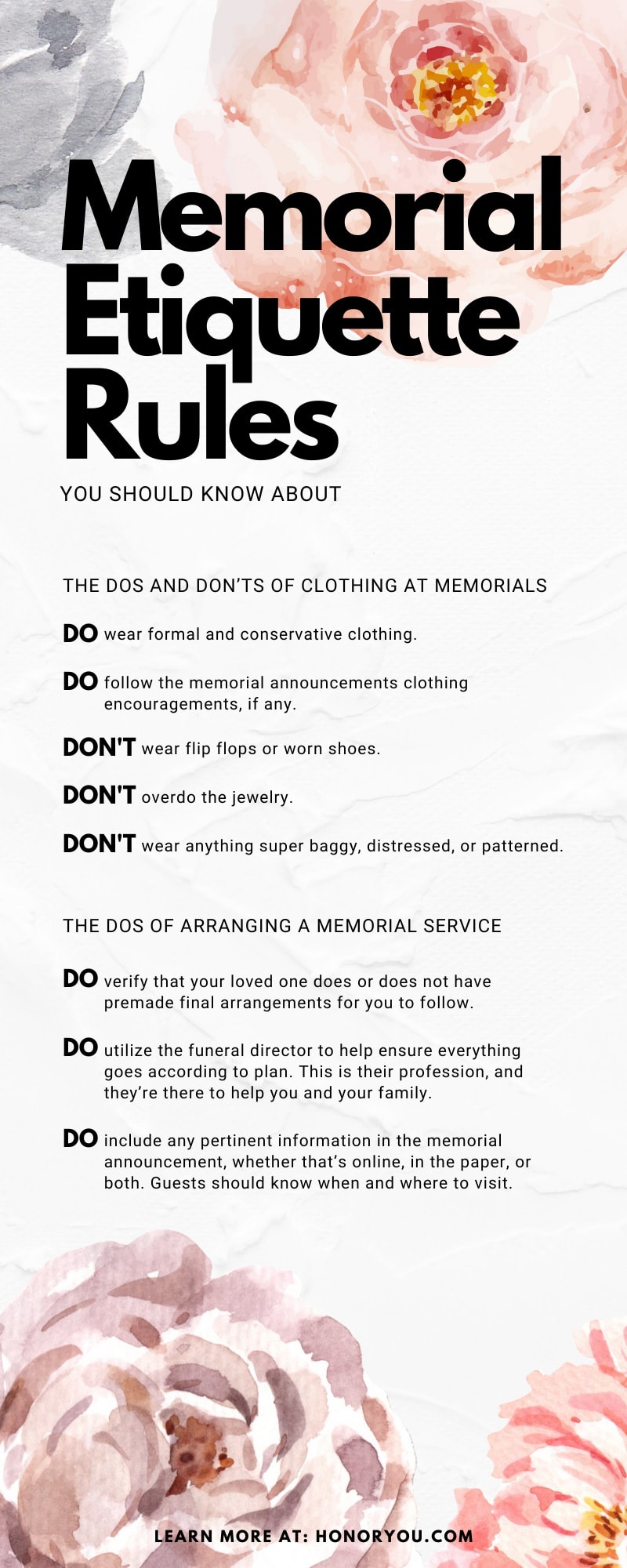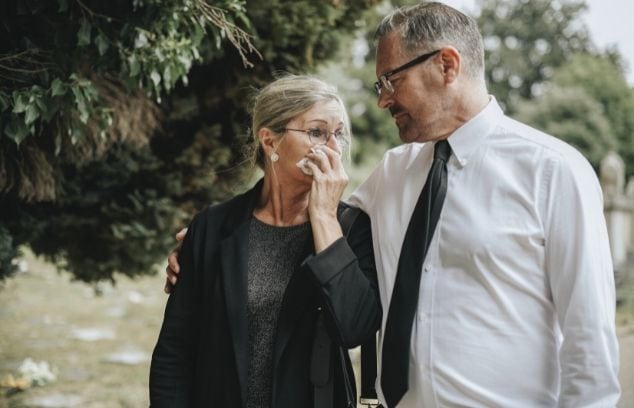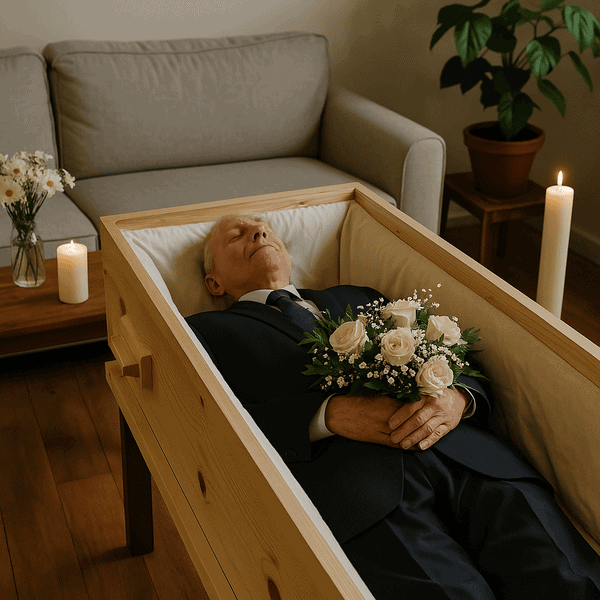Memorial Etiquette Rules You Should Know About

How To Plan a Funeral Service for Your Loved One
July 7, 2021
What Are Funeral Poems and Memorial Prayer Cards?
July 23, 2021If you’ve never been to a memorial, you may be anxious to attend your first one. Your anxieties are totally valid. While considered a celebration of life, memorials are emotionally challenging events—especially if the memorial is for a close family member or friend. On top of stressing over how you may feel at the memorial ceremony, you may be wondering what the proper protocol is on how you should act. While each memorial ceremony is unique to the individual who has passed, there are some etiquette rules that guests assume at every ceremony.
Understanding proper protocol before the date of the memorial can help put some of your anxieties at ease. By relieving a few of your nerves over essential memorial etiquette, you free up more mental capacity to focus on the emotional process of losing a loved one. To help you prioritize dealing with a significant loss and diminish the worry of accidentally being disrespectful at a memorial, Honor You has created a compilation of memorial etiquette rules you should know about.
Attending a Memorial
Preparation is key to calming your jitters for nearly every occasion, memorials included. Below, we’ve listed several dos and don’ts for memorials. From clothes to common courtesies, we’ll cover what you should and shouldn’t do when it comes to memorial services.
The Dos and Don’ts of Clothing at Memorials
When you imagine a memorial service, you probably picture everyone wearing strictly black. Though black is a common color that people wear to memorial services, there is a bit more flexibility than you may assume. Let’s looks at what the standard protocol is for what to wear at a memorial.
- DO wear formal and conservative clothing. Your outfit doesn’t necessarily need to be black, but you should opt for darker colors altogether so as to not draw attention. A few clothing item options for memorial outfits include dresses, blouses, dress pants, skirts, loafers, button-down shirts, suits, sweaters. Essentially, you’ll want to wear your Sunday best but in darker shades.
- DO follow the memorial announcements clothing encouragements, if any. This may mean informal dress. For example, if the organizers of the memorial service encourage visitors to wear the deceased’s favorite color or a Hawaiian shirt to pay homage to their loved one’s memorable wardrobe presence, follow suit. Neglecting their wishes could lead you to stick out like a sore thumb at the service, causing even more anxiety than you had before.
- DON’T wear flip flops or worn shoes. You’ll want to wear a nice pair of shoes, but nothing flashy. While a pair of six-inch heels may be overboard, beat-up sneakers may leave you underdressed. You should also avoid wearing flip flops, which you can substitute for a fancier pair of sandals.
- DON’T overdo the jewelry. Jewelry is a great and easy way to dress up blouses and sweaters, but too much jewelry may be distracting. If you’re concerned that your look has too much going on, try removing an accessory or two and see what a difference it makes.
- DON’T wear anything super baggy, distressed, or patterned. Of course, expressing yourself through fashion is always fun, but memorials aren’t the ideal setting for you to rock your new ripped jeans or graphic polo. These clothing items can appear out of place and be distracting to other guests.
What To Say and What To Avoid Saying at Memorials
Memorials are difficult for a variety of reasons, one being that it’s tricky to navigate what to say to the deceased’s family. You want to convey your sorrow for their loss in a way that’s sensitive and respectful of their grieving process, which is no thoughtless feat. Conveying your well wishes can be especially intimidating if you don’t know the deceased’s family or friends well. We’ve broken down a few recommendations of things you can say and a few other subjects you should avoid saying at a memorial.
What To Say
You may have a couple opportunities to speak with the deceased’s family and friends during visitation, viewing, or reception. With the way most memorial services are organized, it’s appropriate to wait until after the service to share your kind words. You don’t have to come up with anything elaborate to say – just speak from the heart and the message of your meaning is sure to get across.
- Tell the family how you know the deceased and what they meant to you.
- Express your sorrow and condolences for their loss.
- If time allows, you can share a brief memory about the deceased.
What To Avoid Saying
Some phrases can be off pudding at a memorial service. Here are a few things you should avoid saying at a memorial.
- Don’t tell the family that they’ll move on. Their journey with bereavement is uniquely their own, and they don’t need someone making it feel like they should “get over it.”
- Don’t tell a spouse that they’ll find someone else. This may sound like you’re trying to say that the deceased is replaceable or that the spouse should find someone ASAP.
- Don’t ask or talk about the cause of death.
- Don’t point out how much or little folks seem to be emotionally responding to the service. People handle grief in all sorts of ways, and you never know what goes on behind closed doors.
Planning a Memorial
Perhaps you are more involved in the memorial service than most guests. If you have any responsibilities in planning the memorial service, here are some memorial etiquette rules you should know about when making these final arrangements.
The Dos of Arranging a Memorial Service
- DO verify that your loved one does or does not have premade final arrangements for you to follow.
- DO utilize the funeral director to help ensure everything goes according to plan. This is their profession, and they’re there to help you and your family.
- DO include any pertinent information in the memorial announcement, whether that’s online, in the paper, or both. Guests should know when and where to visit.
Whether you’re involved in the memorial planning process or not, Honor You has everything you need to successfully commemorate a deceased loved one. You can peruse through our blogs for guidance on planning services or dealing with the emotional tolls of losing someone. We offer an abundant selection of custom funeral memorial programs for you to choose from to make the service feel more personal. With our assistance, you can ensure a memorial celebration that is well-organized and individualized to the beloved character of the deceased.



